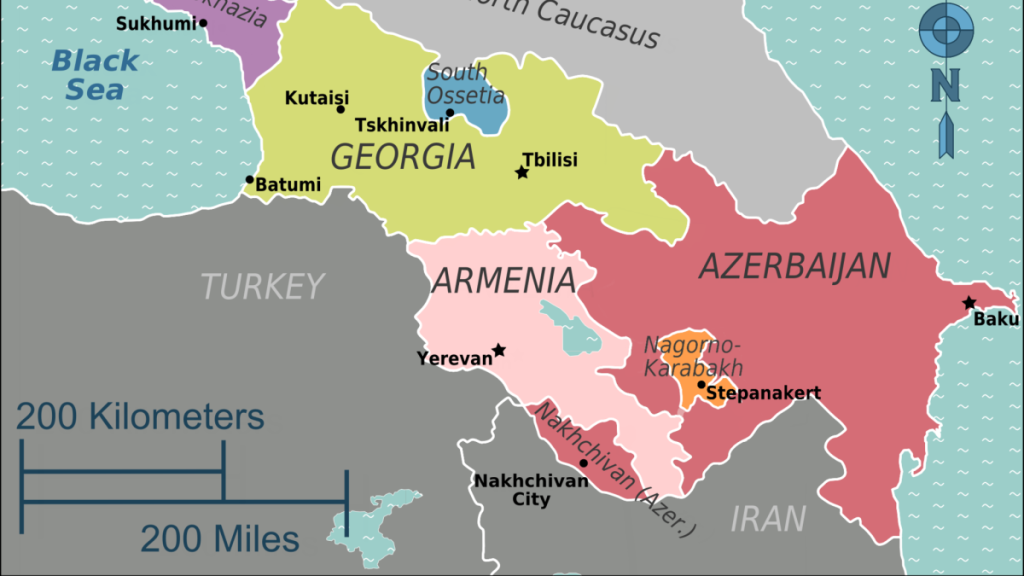When the cat’s away, the mice will play. Russia’s preoccupation with the war in Ukraine has opened up an opportunity for countries such as Iran and Turkey to increase their influence in the South Caucasus – a region that has traditionally been in the Russian geopolitical orbit. But how will a new reality affect positions of Armenia and Azerbaijan – archenemies that fought the 44-day war in 2020, and that are now struggling to resolve their numerous disputes?
Since November 2020, when Armenian Prime Minister Nikol Pashinyan and Azerbaijani President Ilham Aliyev signed a Russia-brokered ceasefire agreement in Moscow, the two nations were involved in several border clashes. During the latest round of hostilities in mid-September, according to figures from both countries, more than 200 service personnel were killed. Even though the situation in the region threatened to escalate, Baku and Yerevan got back to the negotiation table and their representatives held few summits under the auspices of the United States and the European Union.
In point of fact, while the Kremlin continues conducting its “special military operation” in Ukraine, the Western powers are taking a diplomatic initiative from Moscow, and trying to increase their presence in the South Caucasus. At the same time, Iran, a nation that borders both Armenia and Azerbaijan, seeks to portray itself as Yerevan’s patron, although in such a way that would not jeopardize its relations with Baku.
For instance, Javad Hedayati, the Director General of Iran’s Transportation, said on October 4 that energy-rich Azerbaijan wants to create a corridor through Armenian territory that would connect mainland Azerbaijan with its exclave of Nakhchivan. He pointed out that Baku seeks to establish an energy-trade corridor directly from the Caspian Sea to Turkey, and that Azerbaijani authorities want the road to be “out of Armenia’s jurisdiction”. That could be one of the reasons why Mohammad Hossein Bagheri, Chief of Staff of the Armed Forces of Iran, stressed on September 23 that the Islamic Republic “will not tolerate any changes to the regional borders”.
Such a narrative drew criticism in Baku, and in early September Azerbaijani Ambassador to Iran Ali Alizada emphasized that “certain forces” are trying to do a harm to relations between the two neighbors.
“They have been constantly trying to strike at the friendly and fraternal relations between the two countries, but they have never been able to achieve this goal”, said Alizada.
In an attempt to improve relations between the two nations, Azerbaijani Deputy Prime Minister Shahin Mustafayev met with Iranian Ambassador to Azerbaijan Seyyed Abbas Mousavi on September 2. The two officials discussed economic cooperation between Azerbaijan and Iran, which is yet to get developed. In 2021, Azerbaijan’s exports to Iran totaled only $43.3 million, while Azerbaijani imports from Iran were $397.5 million.
Although Iran reportedly aims to strengthen economic ties with Armenia, its trade balance with the landlocked nation of around three million people is still relatively modest. In 2021, Armenia’s exports to Iran reached only $65.4 million, and the volume of Iran’s exports to Armenia totaled $560 million. The Islamic Republic has a significant trade surplus with both Azerbaijan and Armenia, but it is still not on the list of the two nations’ top five trade partners. Thus, its economic and political influence in the region remains rather limited.
That, however, does not mean that Tehran will not at least attempt to achieve some of its geopolitical goals in the South Caucasus. Given that Azerbaijan has no land connection with Nakhchivan, Iran presently serves as a link between mainland Azerbaijan and its exclave. The two neighbors have started building a motorway bridge over the border river of Aras amid plans to set up a new transit corridor connecting Azerbaijan to its exclave of Nakhchivan through the Iranian territory.
Baku, for its part, seems to pressure Yerevan to implement the 2020 ceasefire agreement, and build its section of the Nakhchivan corridor, also known as Zangezur corridor. From Azerbaijani perspective, a corridor passing through Armenia, if built under Baku’s conditions, has a priority over the land link to Nakhchivan through Iran. Indeed, Azerbaijan is interested in the creation of a land passage through the southernmost Armenian province Syunik without passport or customs controls, which is something that Yerevan strongly opposes.
Although the Islamic Republic has repeatedly said that it is not against the construction of the Nakhchivan corridor in Armenia, Tehran would unlikely support a creation of the corridor with no passport or customs controls, since such a transportation route would directly link Azerbaijan with its ally Turkey – Iran’s regional rival. More importantly, if Azerbaijan is given any type of transportation corridor through Armenia, Iran will be further isolated in the region. That is why Iran could be one of the biggest losers if Baku and Yerevan manage to soon normalize relations and start a new chapter in the turbulent South Caucasus region.
